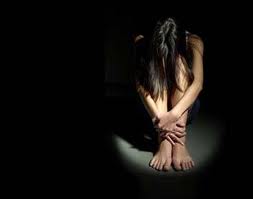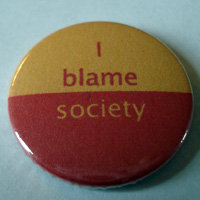It looks like you're using an Ad Blocker.
Please white-list or disable AboveTopSecret.com in your ad-blocking tool.
Thank you.
Some features of ATS will be disabled while you continue to use an ad-blocker.
8
share:
Society and Mental Illness:
The Case of the SPK

Is mental illness “all in your head,” or is society to blame? If so, to what extent? Can mental patients have a political consciousness? Can mental problems be addressed by political or social action? These are serious, important questions relevant to psychology, political philosophy, and medicine.
Is there any question society is crazymaking? Just take a look at the topics on ATS or in the news: we are constantly assailed with tales of doom, injustice, and corruption from the highest levels to the low. Our basic understanding of what is right and wrong, of good and bad, and of fairness and unfairness is strained to the breaking point whenever we glance at newspaper headlines. Is insanity the only sanity in a world gone mad? It certainly feels like it at times, no?

If you go to a normal psychologist today in the developed world to discuss your feelings, you may notice that the source of your problems is always posited as personal: Something within yourself, rather than society. If you are angry, anxious, or depressed, it must because of a chemical imbalance, or something that happened to you in your childhood, your family or friends, or some kind of sexual problem. It is not acceptable to the psychologist if you try to explain your problems in terms of the injustice of society. The shrink will say this is “really” anger at some other inner or interpersonal issue. The expression “I blame society” has become a kind of joke, but underneath it is a real problem. The fact is that society IS a HUGE part of our experience as humans, and what happens as on a political level DOES effect our mental health and our philosophical sense of right and wrong. Conventional psychology and psychiatry’s failure to address this issue is a shocking failure indeed.
 [size=-3]Above: The only answer modern psychology seems to have
[size=-3]Above: The only answer modern psychology seems to have
The SPK, or Sozialistisches Patientenkollektiv, is usually known as the Socialist Patients' Collective in English. Founded in Heidelberg, Germany by Dr. Wolfgang Huber in 1970 under the slogan “Aus der Krankheit eine Waffe machen" ("turn illness into a weapon"), it was a radical attempt to reconfigure our understanding of society, political action, mental illness, and psychology. The group was officially dissolved in 1971, making it a short-lived experiment, although a kind of “descendent group” continues on to this day under the name Patients' Front/Socialist Patients' Collective (PF/SPK(H)).


Here is some general info on the group:
More at source
As you can see, things didn’t end too well for the original SPK, as they spiraled into terrorism and violence. Some of their members became famous for criminal acts later in Germany during the 1970s.
 [size=-3]Above: Brigitte Mohnhaupt, an SPK member who became involved with radical political actions and terrorism in the
1970s
[size=-3]Above: Brigitte Mohnhaupt, an SPK member who became involved with radical political actions and terrorism in the
1970s
Even so, I think their basic philosophical ideas bear careful consideration:
More at source: Wikipedia


Do I agree with the SPK? Not really. It ended up embroiled in violence and mayhem all too easily. I also believe some mental illness is organic in nature, and it cannot be said that all illness is social. But a lot of it clearly is. And on a theoretical level, I find the SPK's ideas intriguing because they attempted to provide radical answers to problems that haven’t really been adequately addressed, before or since.

For more information:
The group’s homepage in German
And in English
A work by the group, "Aus der Krankheit eine Waffe machen” (in German)
A page with some good general information
The Case of the SPK

Is mental illness “all in your head,” or is society to blame? If so, to what extent? Can mental patients have a political consciousness? Can mental problems be addressed by political or social action? These are serious, important questions relevant to psychology, political philosophy, and medicine.
Is there any question society is crazymaking? Just take a look at the topics on ATS or in the news: we are constantly assailed with tales of doom, injustice, and corruption from the highest levels to the low. Our basic understanding of what is right and wrong, of good and bad, and of fairness and unfairness is strained to the breaking point whenever we glance at newspaper headlines. Is insanity the only sanity in a world gone mad? It certainly feels like it at times, no?

If you go to a normal psychologist today in the developed world to discuss your feelings, you may notice that the source of your problems is always posited as personal: Something within yourself, rather than society. If you are angry, anxious, or depressed, it must because of a chemical imbalance, or something that happened to you in your childhood, your family or friends, or some kind of sexual problem. It is not acceptable to the psychologist if you try to explain your problems in terms of the injustice of society. The shrink will say this is “really” anger at some other inner or interpersonal issue. The expression “I blame society” has become a kind of joke, but underneath it is a real problem. The fact is that society IS a HUGE part of our experience as humans, and what happens as on a political level DOES effect our mental health and our philosophical sense of right and wrong. Conventional psychology and psychiatry’s failure to address this issue is a shocking failure indeed.

The SPK, or Sozialistisches Patientenkollektiv, is usually known as the Socialist Patients' Collective in English. Founded in Heidelberg, Germany by Dr. Wolfgang Huber in 1970 under the slogan “Aus der Krankheit eine Waffe machen" ("turn illness into a weapon"), it was a radical attempt to reconfigure our understanding of society, political action, mental illness, and psychology. The group was officially dissolved in 1971, making it a short-lived experiment, although a kind of “descendent group” continues on to this day under the name Patients' Front/Socialist Patients' Collective (PF/SPK(H)).


Here is some general info on the group:
SPK defined Late Capitalist society as terminally ill - a machine that produces a surplus population who are physically and psychologically sick. For this society to be cured it must of necessity undergo a fundamental social revolution. SPK held to the ideology that patients, in order to escape their personal mental illnesses, foment violent attacks on bourgeois society as an intrinsic part of the therapeutic process. Accordingly SPK desired to subvert mental illness, forging it into a weapon against society.
The following are clear examples of the SPK's slogans - epitomizing their ideological objectives:
"Therapy through violence."
"Bomb for mental health."
"Kill for inner peace."
"The system has made us sick."
"Let us strike the death blow to the sick system."
When parts of the group instigated their militant praxis, Dr. Huber was imprisoned (June 1971) and the group was eventually dissolved.
More at source
As you can see, things didn’t end too well for the original SPK, as they spiraled into terrorism and violence. Some of their members became famous for criminal acts later in Germany during the 1970s.

Even so, I think their basic philosophical ideas bear careful consideration:
...For the SPK, illness really exists as an undeniable fact and it is caused by the capitalist system. The SPK is pro illness, in favor of illness, considering illness as the protest against capitalism and considering illness the anticipation of the human species that does not yet exist but that should be created through illness. The SPK fights against capitalism and against all doctors considering them to be the ruling class of the system and poisonous to the human species…
…In a 4-room apartment at Heidelberg, the SPK aimed to establish a free space for political therapy, re-framing illness as a contradiction created by capitalism, which could be embraced to bring an end to the system which gave it life. They believed that the sick formed a revolutionary class of dispossessed people, who could be radicalized to struggle against oppression. Organizing by sickness instead of socio-economic class allowed middle-class, student leftists to articulate their own feelings of psychic and political oppression and struggle against the status quo in their own right, along with other oppressed groups. Additionally, sickness had the advantage of being, according to the SPK, familiar to everyone, and so everyone was a potential revolutionary, so long as they disavowed the medical establishment. Like other anti-psychiatry experiments, such as Kingsley Hall and Villa 21, they questioned the patient/doctor division, going so far as to call for an end to the "doctor's class".
The collective produced leaflets, held teach-ins, and petitioned the school to increase awareness and gain recognition for their experiment, which was informed by Hegel, Marx, Freud, and Reich. They conducted individual and group agitations, called "single" and "group agitations", working from 9 am to 10 pm or later.
More at source: Wikipedia


Do I agree with the SPK? Not really. It ended up embroiled in violence and mayhem all too easily. I also believe some mental illness is organic in nature, and it cannot be said that all illness is social. But a lot of it clearly is. And on a theoretical level, I find the SPK's ideas intriguing because they attempted to provide radical answers to problems that haven’t really been adequately addressed, before or since.

For more information:
The group’s homepage in German
And in English
A work by the group, "Aus der Krankheit eine Waffe machen” (in German)
A page with some good general information
edit on 23-3-2012 by Leftist because: (no reason given)
These people were ahead of their time, in many ways. However, they took it too far. As you yourself noted, not everything is social. A schizophrenic
is a schizophrenic no matter what.
Depression, anxiety, and the like...that's a different story, though.
The reason psychology doesn't admit this is that psychology and psychiatry are mechanisms of state control. They are actually used to keep people from rebelling, if you know what I mean.
Depression, anxiety, and the like...that's a different story, though.
The reason psychology doesn't admit this is that psychology and psychiatry are mechanisms of state control. They are actually used to keep people from rebelling, if you know what I mean.
reply to post by Leftist
Great thread, and very well written,
S&F for you.
Firstly I would like to say that animals are a product of their environment, this we know as fact. People adapt to their environment and find ways to cope with problems or obstacles in that environment, this adaption to problems can often create short comings in other areas especially in a mental adaption rather than physical.
Society undoubtedly plays a huge role in our lives and it seems that while small problems in our close family life get blown out of proportion, big problems in society get ignored and blown under the table.
I think we tend to bottle up problems we see in society, which would appear to be the catalyst for a mental illness.
If anything close family problems or problems within yourself come out much more freely.
The only reason I can see for modern psychology ruling out the 'society root of the problem' idea is because it’s much easier to sell drugs to people when they think the problem is themselves. I mean you can’t take a pill to fix the world around you can you.
Money is at the root of modern psychology and it is fairly unrealistic to think that this problem of diagnosis has to do with anything else.
Great thread, and very well written,
S&F for you.
Firstly I would like to say that animals are a product of their environment, this we know as fact. People adapt to their environment and find ways to cope with problems or obstacles in that environment, this adaption to problems can often create short comings in other areas especially in a mental adaption rather than physical.
Society undoubtedly plays a huge role in our lives and it seems that while small problems in our close family life get blown out of proportion, big problems in society get ignored and blown under the table.
I think we tend to bottle up problems we see in society, which would appear to be the catalyst for a mental illness.
If anything close family problems or problems within yourself come out much more freely.
The only reason I can see for modern psychology ruling out the 'society root of the problem' idea is because it’s much easier to sell drugs to people when they think the problem is themselves. I mean you can’t take a pill to fix the world around you can you.
Money is at the root of modern psychology and it is fairly unrealistic to think that this problem of diagnosis has to do with anything else.
Dr. Norberto Keppe and Cláudia Bernhardt de Souza Pacheco have done some good work in the area of psycho social pathology, without the terrorism
aspect but do acknowledge its contribution. I first came across them through a tv program called 'Stop the destruction of the world'. They do put
together a strong case for the links between disease and society.
Here is a good article on the subject of income inequalities and health and social problems and how they are related.
Some quotes :
It means that a poor guy in a poor but more equal country do better than a poor guy in a rich but less equal country. And in some cases, the poor guy in the more equal country can do better than a richer guy in a less equal country.
article
Some quotes :
One study, for example, suggested that the loss of life from income inequality in the US in 1990 was the equivalent of the combined loss of life due to lung cancer, diabetes, motor vehicle accidents, HIV infection, suicide and homicide.
Some research comparing different groups in different countries suggests that people in lower socio-economic groups in more equal countries do better than those in lower socio-economic groups in more unequal countries. They may even sometimes do better than people in higher socio-economic groups in more unequal countries.
It means that a poor guy in a poor but more equal country do better than a poor guy in a rich but less equal country. And in some cases, the poor guy in the more equal country can do better than a richer guy in a less equal country.
article
The doctor mentioned in the first post sounds completely insane. What kind of a healer mobilizes mentally ill people to serve as some kind of
revolutionary guerella cell? That's not only crack-brained, its evil.
This crazy group is one issue. The idea that society might bear some responsibility for mental illness is a totally different issue. I can get behind the latter, but not the former. By putting the two together, I guess this thread kind of like the picture of Brigitte Mohnhaupt in the original post: Very attractive and super-hot, while simultaneously deranged and dangerous.
This crazy group is one issue. The idea that society might bear some responsibility for mental illness is a totally different issue. I can get behind the latter, but not the former. By putting the two together, I guess this thread kind of like the picture of Brigitte Mohnhaupt in the original post: Very attractive and super-hot, while simultaneously deranged and dangerous.
reply to post by TheXoor
In a way I accept what you say; I think that the project was a failure for lots of reasons, as I stated. But the SPK deserves mention because it was the first - and, so far as I know, the only - attempt to rectify the oppressive nature of the psychiatric and psychological community.
Psychology/psychiatry is, as another poster correctly noted, a form of state control, among other things. One of its most important roles is not so much to heal as to reconfigure pathology so that it serves the state control matrix. If you are depressed because you are experiencing injustices of various sorts, the shrink will help steer you towards self-blame ("look within") and medication. It is an enormously unjust way to behave and the medical/psychological community needs to be called out on it.
The SPK might have been an incoherent yell in the face of this unfairness , but its the only yell we have, thus far anyway.
In a way I accept what you say; I think that the project was a failure for lots of reasons, as I stated. But the SPK deserves mention because it was the first - and, so far as I know, the only - attempt to rectify the oppressive nature of the psychiatric and psychological community.
Psychology/psychiatry is, as another poster correctly noted, a form of state control, among other things. One of its most important roles is not so much to heal as to reconfigure pathology so that it serves the state control matrix. If you are depressed because you are experiencing injustices of various sorts, the shrink will help steer you towards self-blame ("look within") and medication. It is an enormously unjust way to behave and the medical/psychological community needs to be called out on it.
The SPK might have been an incoherent yell in the face of this unfairness , but its the only yell we have, thus far anyway.
Originally posted by Leftist
reply to post by TheXoor
If you are depressed because you are experiencing injustices of various sorts, the shrink will help steer you towards self-blame ("look within") and medication.
Two people could experience the same injustice, yet only one become depressed. If you were able to view and compare the internal worlds of these two hypothetical people, you would find that the one who becomes depressed lacks positive coping strategies and the ability to take ownership of how they are feeling. You can blame external forces for making you feel sad but ultimately how you choose to respond to those feelings of sadness is up to you. Pay negative thoughts too much attention and eventually they become you.
edit on 25-3-2012 by particlezen because: (no reason given)
Originally posted by particlezen
You can blame external forces for making you feel sad but ultimately how you choose to respond to those feelings of sadness is up to you. Pay negative thoughts too much attention and eventually they become you.
Imagine somebody shackled to a post spiked outside a doghouse, left to die with no food and water. If he tells you he is feeling blue, how much use would your advice be?
I think a chain-cutter, a crowbar, and blowtorch would be more useful in that situation than "think happy thoughts and click your heels." Thus, too, in the real world as a whole.
new topics
-
RIP Merrily Harpur British Big Cat Realist
Cryptozoology: 1 hours ago -
Australian mercenary caught and crying as he is a prisoner of war.
Other Current Events: 6 hours ago -
JILL BIDEN Wants JOE to Punish Democrats Who Forced Him to Leave Office in Disgrace on 1.20.2025.
2024 Elections: 7 hours ago -
Panamanian President-“every square meter” of the Panama Canal belongs to Panama.
New World Order: 8 hours ago -
NYPD arrests migrant who allegedly set woman on fire on subway train, watched her burn to death
Breaking Alternative News: 10 hours ago
top topics
-
California Business Owners Blindsided by Surprise Payroll Taxes
US Political Madness: 15 hours ago, 20 flags -
The clotting is not going away latest
Medical Issues & Conspiracies: 13 hours ago, 10 flags -
F-18 shot down over Red Sea....by our own Destroyer?
Other Current Events: 15 hours ago, 7 flags -
NYPD arrests migrant who allegedly set woman on fire on subway train, watched her burn to death
Breaking Alternative News: 10 hours ago, 6 flags -
Panamanian President-“every square meter” of the Panama Canal belongs to Panama.
New World Order: 8 hours ago, 6 flags -
Australian mercenary caught and crying as he is a prisoner of war.
Other Current Events: 6 hours ago, 6 flags -
JILL BIDEN Wants JOE to Punish Democrats Who Forced Him to Leave Office in Disgrace on 1.20.2025.
2024 Elections: 7 hours ago, 5 flags -
Chef Gerald R. Ford
Food and Cooking: 13 hours ago, 2 flags -
RIP Merrily Harpur British Big Cat Realist
Cryptozoology: 1 hours ago, 2 flags
active topics
-
F-18 shot down over Red Sea....by our own Destroyer?
Other Current Events • 11 • : 38181 -
Panamanian President-“every square meter” of the Panama Canal belongs to Panama.
New World Order • 7 • : Flyingclaydisk -
Australian mercenary caught and crying as he is a prisoner of war.
Other Current Events • 5 • : Flyingclaydisk -
RIP Merrily Harpur British Big Cat Realist
Cryptozoology • 0 • : TimBurr -
‘Something horrible’: Somerset pit reveals bronze age cannibalism
Ancient & Lost Civilizations • 17 • : BrucellaOrchitis -
Why isn't Psychiatry involved?
Social Issues and Civil Unrest • 30 • : BrucellaOrchitis -
The Daily Mail trying to imply “it’s aliens”
Dissecting Disinformation • 12 • : KrustyKrab -
The Effects of Electric Fields and Plasma on Plant Growth
Science & Technology • 8 • : ChaoticOrder -
Post A Funny (T&C Friendly) Pic Part IV: The LOL awakens!
General Chit Chat • 7945 • : KrustyKrab -
JILL BIDEN Wants JOE to Punish Democrats Who Forced Him to Leave Office in Disgrace on 1.20.2025.
2024 Elections • 5 • : KrustyKrab
8
